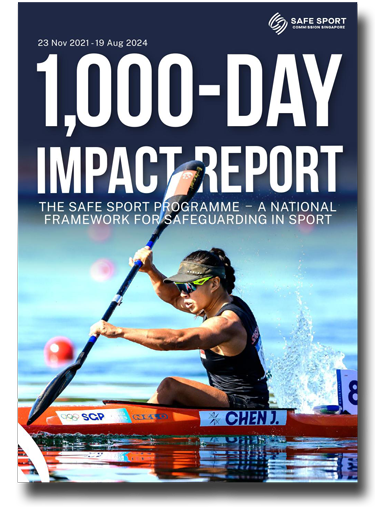Safe Sport Commission Releases 1000 Day Impact Report
The Safe Sport Programme, a harmonised framework for safeguarding sport in Singapore, recently marked its 1,000th day. To commemorate this milestone, the Safe Sport Commission released an impact report to highlight the significant strides made to foster a positive sporting environment in the areas of policymaking, training and education and case management - the three central pillars of the Safe Sport framework.
Policymaking
Launched in November 2021, the Safe Sport Programme sets a comprehensive standard for safeguarding practices across the sporting community that has been widely embraced by athletes, parents, coaches, instructors, and sports administrators.
To date, 60 sporting organisations have signed onto the national framework. Member organisations have incorporated the Safe Sport Unified Code into their organisational policies and governance documentations, as well as put in place mechanisms for reporting and responding to concerns.
As a key signatory to the Safe Sport Programme, Sport Singapore (SportSG) has taken the lead to protect the well-being of its participants, which has impacted close to 150,000 persons under its initiatives, including ActiveSG facility users and Learn-to-Play programme participants, children and youths participants in the ActiveSG Academies and Clubs, Team Nila volunteers, Team Singapore athletes supported by the Singapore Sport Institute (SSI) and coaches registered with the National Registry of Coaches (NROC).
Training and Education
In the aspect of training and education, the Safe Sport Commission has been actively engaging the sporting community to nurture a culture of awareness and accountability across the sport organisations. As of 19 August 2024, the team has conducted 292 man-hours of workshops and outreach, trained 431 safeguarding officers across 138 organisations, and achieved a completion of 9,247 training modules.
Through collaborations with the Singapore Institute of Architects and Institutes of Higher Learning (IHLs), the Safe Sport Commission also continues to explore other aspects of safe sport, for example, how the design of the physical environment contributes to incidents of abuse and harassment, as well as understanding bystander behaviours.
Case Management
The streamlined case management service has been a crucial part of the Safe Sport Programme as it allows for independent investigation of reports of concern, which gives assurance to affected parties and respondents that reports will be managed fairly. It also relieves member organisations of the administrative burden of investigating serious cases and ensuring appropriately trained personnel are involved.
In the first 1,000 days, the Safe Sport Commission received 274 reports of concern, of which 126 reports were assessed to be related to misconduct under the Safe Sport Unified Code. The most number of reported cases were relating to physical and psychological misconduct, which comprise slightly over half (56%) of the total cases. Athletes (32%) represented the largest group of affected parties, while coaches (48%) represented the largest group of respondents. Majority of the misconduct cases (62%) were classified as low severity, while 21% and 17% were classified as moderate and severe cases respectively.
Moderate and severe cases were referred to the Safe Sport Disciplinary Panel, where the Panel will ascertain the seriousness of the misconduct based on the degree of culpability and harm caused, and consider the aggravating and mitigating factors before coming to a decision on the appropriate measures or sections. Since it was first appointed in August 2022, the Safe Sport Disciplinary Panel, has convened nine hearings to date, and issued sanctions ranging from suspensions to permanent ineligibility. The outcomes of the hearings are listed in a disciplinary database.
View the full 1,000-day Impact Report.


